Comparing Sociological Perspectives: Theories and Society
VerifiedAdded on 2023/04/25
|5
|1316
|354
Essay
AI Summary
This essay provides a comprehensive overview of three major sociological theories: structural functionalism, social conflict theory, and symbolic interactionism. It delves into the core concepts of each perspective, explaining how they view the relationship between individuals and society. The essay highlights the key figures associated with each theory, such as Herbert Spencer, Emile Durkheim, Karl Marx, Max Weber, and George Homans, and discusses their contributions to the field. It compares and contrasts the similarities and differences between the theories, particularly focusing on their macro and micro-level approaches. Furthermore, the essay explores the application of these theories to understanding social institutions, inequality, and human interactions. The essay also examines the work of Karl Marx, emphasizing his significant contributions to social conflict theory and his influence on the development of sociological thought. The conclusion summarizes the contributions of each theory to the field of sociology.
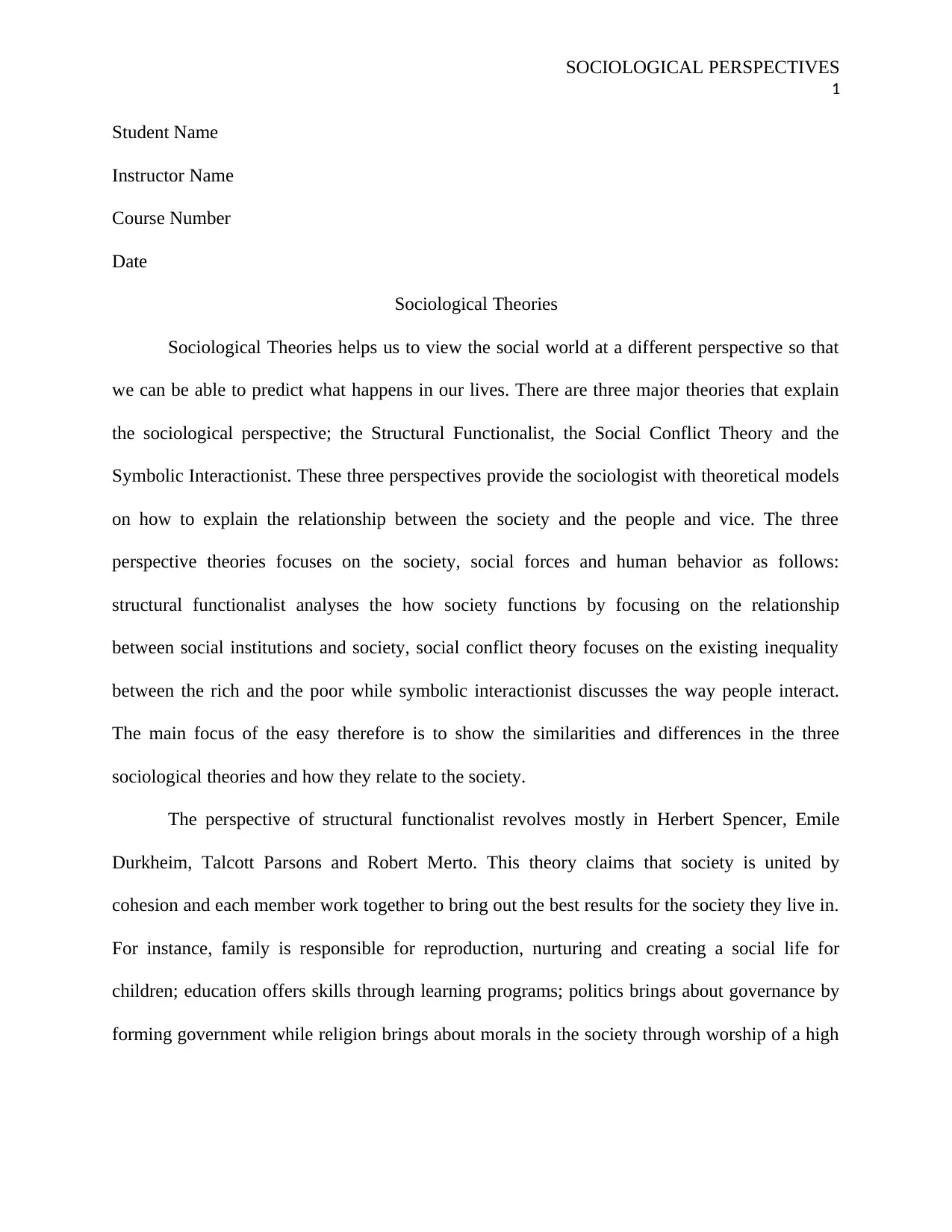
SOCIOLOGICAL PERSPECTIVES
1
Student Name
Instructor Name
Course Number
Date
Sociological Theories
Sociological Theories helps us to view the social world at a different perspective so that
we can be able to predict what happens in our lives. There are three major theories that explain
the sociological perspective; the Structural Functionalist, the Social Conflict Theory and the
Symbolic Interactionist. These three perspectives provide the sociologist with theoretical models
on how to explain the relationship between the society and the people and vice. The three
perspective theories focuses on the society, social forces and human behavior as follows:
structural functionalist analyses the how society functions by focusing on the relationship
between social institutions and society, social conflict theory focuses on the existing inequality
between the rich and the poor while symbolic interactionist discusses the way people interact.
The main focus of the easy therefore is to show the similarities and differences in the three
sociological theories and how they relate to the society.
The perspective of structural functionalist revolves mostly in Herbert Spencer, Emile
Durkheim, Talcott Parsons and Robert Merto. This theory claims that society is united by
cohesion and each member work together to bring out the best results for the society they live in.
For instance, family is responsible for reproduction, nurturing and creating a social life for
children; education offers skills through learning programs; politics brings about governance by
forming government while religion brings about morals in the society through worship of a high
1
Student Name
Instructor Name
Course Number
Date
Sociological Theories
Sociological Theories helps us to view the social world at a different perspective so that
we can be able to predict what happens in our lives. There are three major theories that explain
the sociological perspective; the Structural Functionalist, the Social Conflict Theory and the
Symbolic Interactionist. These three perspectives provide the sociologist with theoretical models
on how to explain the relationship between the society and the people and vice. The three
perspective theories focuses on the society, social forces and human behavior as follows:
structural functionalist analyses the how society functions by focusing on the relationship
between social institutions and society, social conflict theory focuses on the existing inequality
between the rich and the poor while symbolic interactionist discusses the way people interact.
The main focus of the easy therefore is to show the similarities and differences in the three
sociological theories and how they relate to the society.
The perspective of structural functionalist revolves mostly in Herbert Spencer, Emile
Durkheim, Talcott Parsons and Robert Merto. This theory claims that society is united by
cohesion and each member work together to bring out the best results for the society they live in.
For instance, family is responsible for reproduction, nurturing and creating a social life for
children; education offers skills through learning programs; politics brings about governance by
forming government while religion brings about morals in the society through worship of a high
Paraphrase This Document
Need a fresh take? Get an instant paraphrase of this document with our AI Paraphraser
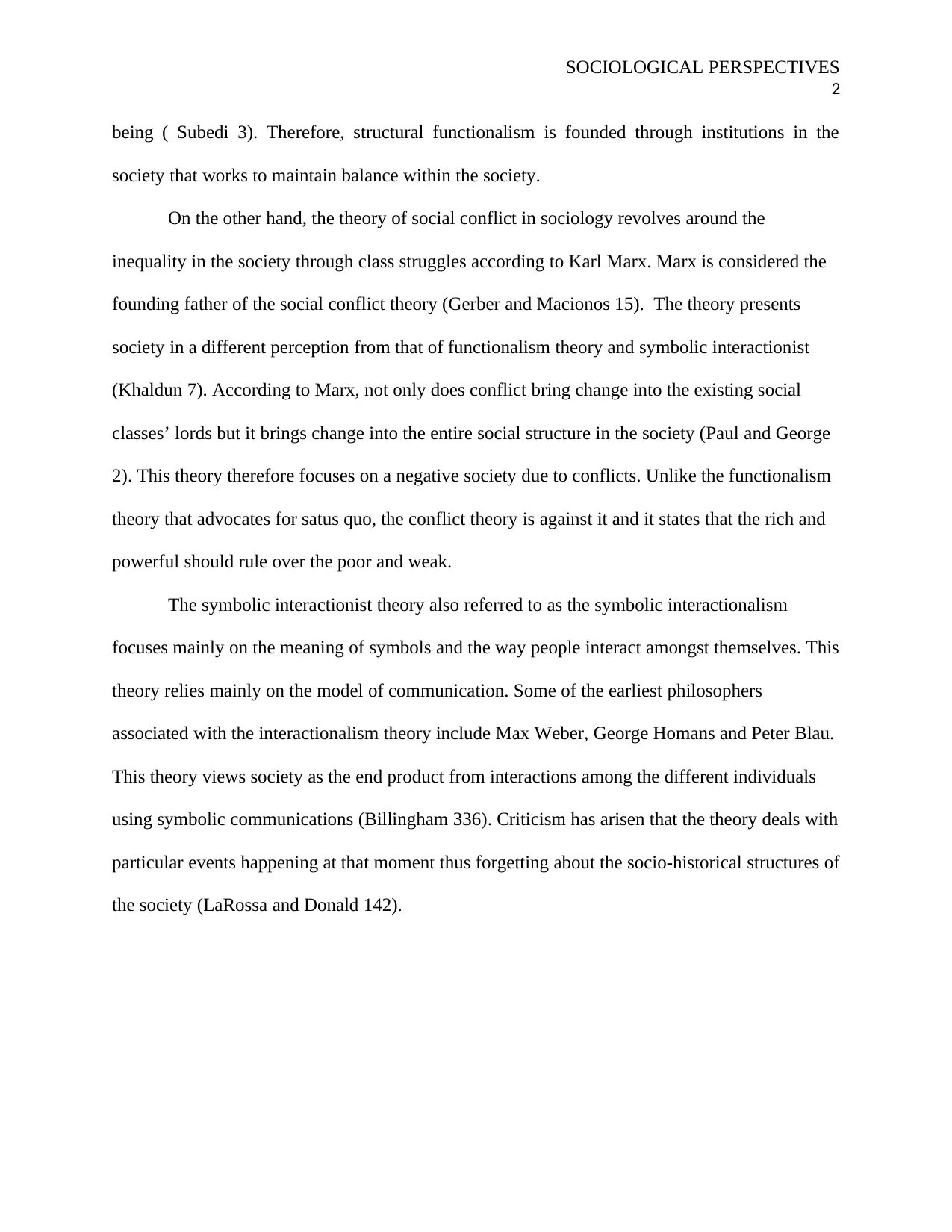
SOCIOLOGICAL PERSPECTIVES
2
being ( Subedi 3). Therefore, structural functionalism is founded through institutions in the
society that works to maintain balance within the society.
On the other hand, the theory of social conflict in sociology revolves around the
inequality in the society through class struggles according to Karl Marx. Marx is considered the
founding father of the social conflict theory (Gerber and Macionos 15). The theory presents
society in a different perception from that of functionalism theory and symbolic interactionist
(Khaldun 7). According to Marx, not only does conflict bring change into the existing social
classes’ lords but it brings change into the entire social structure in the society (Paul and George
2). This theory therefore focuses on a negative society due to conflicts. Unlike the functionalism
theory that advocates for satus quo, the conflict theory is against it and it states that the rich and
powerful should rule over the poor and weak.
The symbolic interactionist theory also referred to as the symbolic interactionalism
focuses mainly on the meaning of symbols and the way people interact amongst themselves. This
theory relies mainly on the model of communication. Some of the earliest philosophers
associated with the interactionalism theory include Max Weber, George Homans and Peter Blau.
This theory views society as the end product from interactions among the different individuals
using symbolic communications (Billingham 336). Criticism has arisen that the theory deals with
particular events happening at that moment thus forgetting about the socio-historical structures of
the society (LaRossa and Donald 142).
2
being ( Subedi 3). Therefore, structural functionalism is founded through institutions in the
society that works to maintain balance within the society.
On the other hand, the theory of social conflict in sociology revolves around the
inequality in the society through class struggles according to Karl Marx. Marx is considered the
founding father of the social conflict theory (Gerber and Macionos 15). The theory presents
society in a different perception from that of functionalism theory and symbolic interactionist
(Khaldun 7). According to Marx, not only does conflict bring change into the existing social
classes’ lords but it brings change into the entire social structure in the society (Paul and George
2). This theory therefore focuses on a negative society due to conflicts. Unlike the functionalism
theory that advocates for satus quo, the conflict theory is against it and it states that the rich and
powerful should rule over the poor and weak.
The symbolic interactionist theory also referred to as the symbolic interactionalism
focuses mainly on the meaning of symbols and the way people interact amongst themselves. This
theory relies mainly on the model of communication. Some of the earliest philosophers
associated with the interactionalism theory include Max Weber, George Homans and Peter Blau.
This theory views society as the end product from interactions among the different individuals
using symbolic communications (Billingham 336). Criticism has arisen that the theory deals with
particular events happening at that moment thus forgetting about the socio-historical structures of
the society (LaRossa and Donald 142).
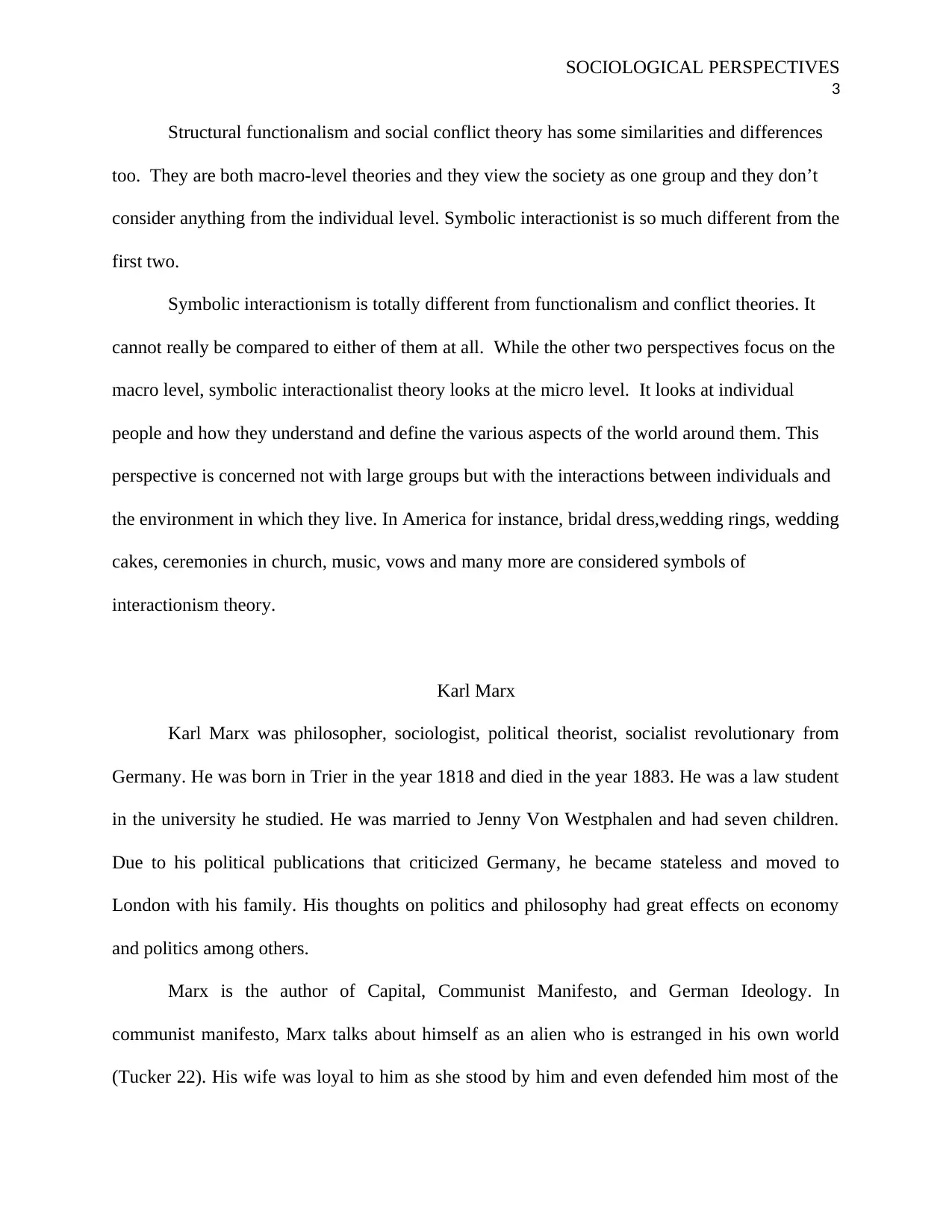
SOCIOLOGICAL PERSPECTIVES
3
Structural functionalism and social conflict theory has some similarities and differences
too. They are both macro-level theories and they view the society as one group and they don’t
consider anything from the individual level. Symbolic interactionist is so much different from the
first two.
Symbolic interactionism is totally different from functionalism and conflict theories. It
cannot really be compared to either of them at all. While the other two perspectives focus on the
macro level, symbolic interactionalist theory looks at the micro level. It looks at individual
people and how they understand and define the various aspects of the world around them. This
perspective is concerned not with large groups but with the interactions between individuals and
the environment in which they live. In America for instance, bridal dress,wedding rings, wedding
cakes, ceremonies in church, music, vows and many more are considered symbols of
interactionism theory.
Karl Marx
Karl Marx was philosopher, sociologist, political theorist, socialist revolutionary from
Germany. He was born in Trier in the year 1818 and died in the year 1883. He was a law student
in the university he studied. He was married to Jenny Von Westphalen and had seven children.
Due to his political publications that criticized Germany, he became stateless and moved to
London with his family. His thoughts on politics and philosophy had great effects on economy
and politics among others.
Marx is the author of Capital, Communist Manifesto, and German Ideology. In
communist manifesto, Marx talks about himself as an alien who is estranged in his own world
(Tucker 22). His wife was loyal to him as she stood by him and even defended him most of the
3
Structural functionalism and social conflict theory has some similarities and differences
too. They are both macro-level theories and they view the society as one group and they don’t
consider anything from the individual level. Symbolic interactionist is so much different from the
first two.
Symbolic interactionism is totally different from functionalism and conflict theories. It
cannot really be compared to either of them at all. While the other two perspectives focus on the
macro level, symbolic interactionalist theory looks at the micro level. It looks at individual
people and how they understand and define the various aspects of the world around them. This
perspective is concerned not with large groups but with the interactions between individuals and
the environment in which they live. In America for instance, bridal dress,wedding rings, wedding
cakes, ceremonies in church, music, vows and many more are considered symbols of
interactionism theory.
Karl Marx
Karl Marx was philosopher, sociologist, political theorist, socialist revolutionary from
Germany. He was born in Trier in the year 1818 and died in the year 1883. He was a law student
in the university he studied. He was married to Jenny Von Westphalen and had seven children.
Due to his political publications that criticized Germany, he became stateless and moved to
London with his family. His thoughts on politics and philosophy had great effects on economy
and politics among others.
Marx is the author of Capital, Communist Manifesto, and German Ideology. In
communist manifesto, Marx talks about himself as an alien who is estranged in his own world
(Tucker 22). His wife was loyal to him as she stood by him and even defended him most of the
⊘ This is a preview!⊘
Do you want full access?
Subscribe today to unlock all pages.

Trusted by 1+ million students worldwide
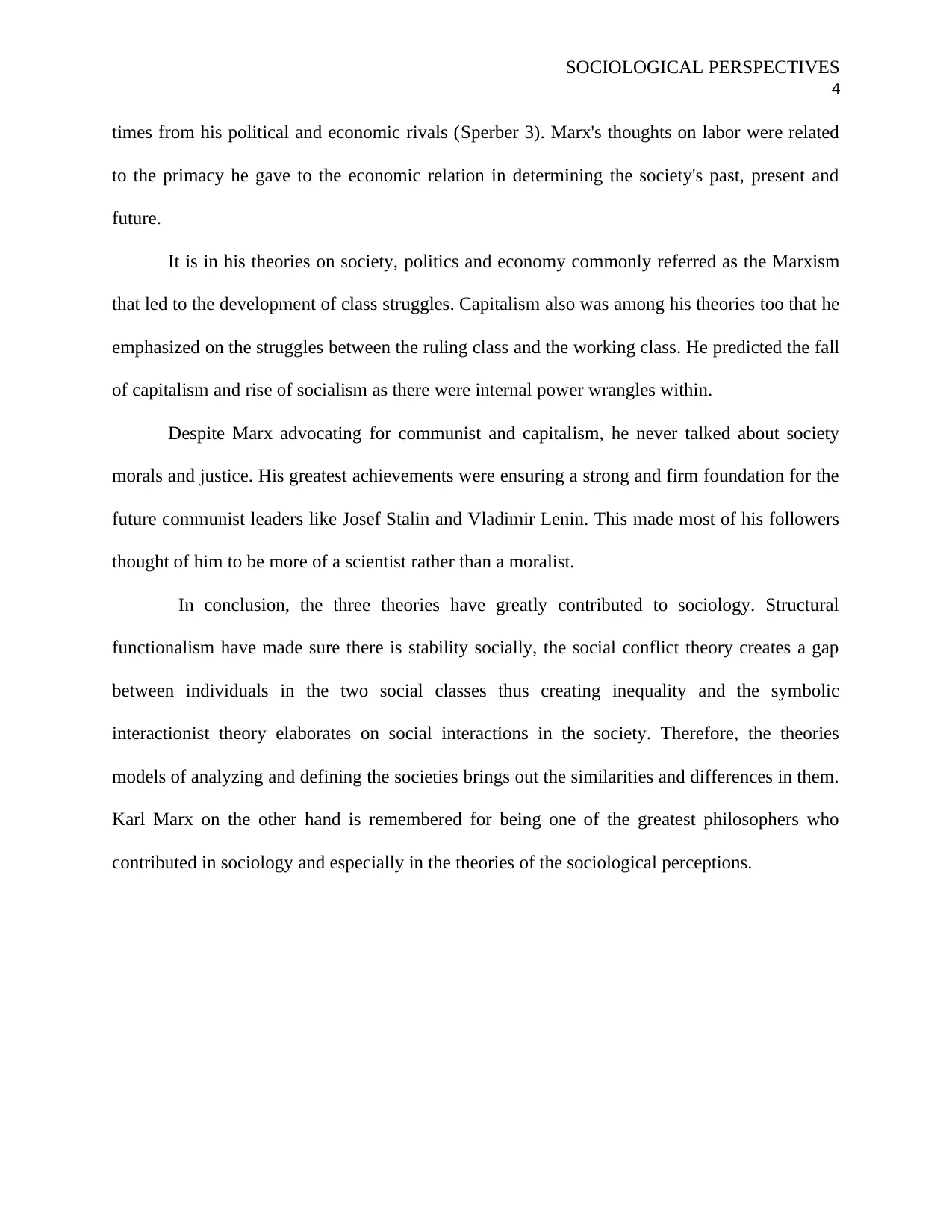
SOCIOLOGICAL PERSPECTIVES
4
times from his political and economic rivals (Sperber 3). Marx's thoughts on labor were related
to the primacy he gave to the economic relation in determining the society's past, present and
future.
It is in his theories on society, politics and economy commonly referred as the Marxism
that led to the development of class struggles. Capitalism also was among his theories too that he
emphasized on the struggles between the ruling class and the working class. He predicted the fall
of capitalism and rise of socialism as there were internal power wrangles within.
Despite Marx advocating for communist and capitalism, he never talked about society
morals and justice. His greatest achievements were ensuring a strong and firm foundation for the
future communist leaders like Josef Stalin and Vladimir Lenin. This made most of his followers
thought of him to be more of a scientist rather than a moralist.
In conclusion, the three theories have greatly contributed to sociology. Structural
functionalism have made sure there is stability socially, the social conflict theory creates a gap
between individuals in the two social classes thus creating inequality and the symbolic
interactionist theory elaborates on social interactions in the society. Therefore, the theories
models of analyzing and defining the societies brings out the similarities and differences in them.
Karl Marx on the other hand is remembered for being one of the greatest philosophers who
contributed in sociology and especially in the theories of the sociological perceptions.
4
times from his political and economic rivals (Sperber 3). Marx's thoughts on labor were related
to the primacy he gave to the economic relation in determining the society's past, present and
future.
It is in his theories on society, politics and economy commonly referred as the Marxism
that led to the development of class struggles. Capitalism also was among his theories too that he
emphasized on the struggles between the ruling class and the working class. He predicted the fall
of capitalism and rise of socialism as there were internal power wrangles within.
Despite Marx advocating for communist and capitalism, he never talked about society
morals and justice. His greatest achievements were ensuring a strong and firm foundation for the
future communist leaders like Josef Stalin and Vladimir Lenin. This made most of his followers
thought of him to be more of a scientist rather than a moralist.
In conclusion, the three theories have greatly contributed to sociology. Structural
functionalism have made sure there is stability socially, the social conflict theory creates a gap
between individuals in the two social classes thus creating inequality and the symbolic
interactionist theory elaborates on social interactions in the society. Therefore, the theories
models of analyzing and defining the societies brings out the similarities and differences in them.
Karl Marx on the other hand is remembered for being one of the greatest philosophers who
contributed in sociology and especially in the theories of the sociological perceptions.
Paraphrase This Document
Need a fresh take? Get an instant paraphrase of this document with our AI Paraphraser
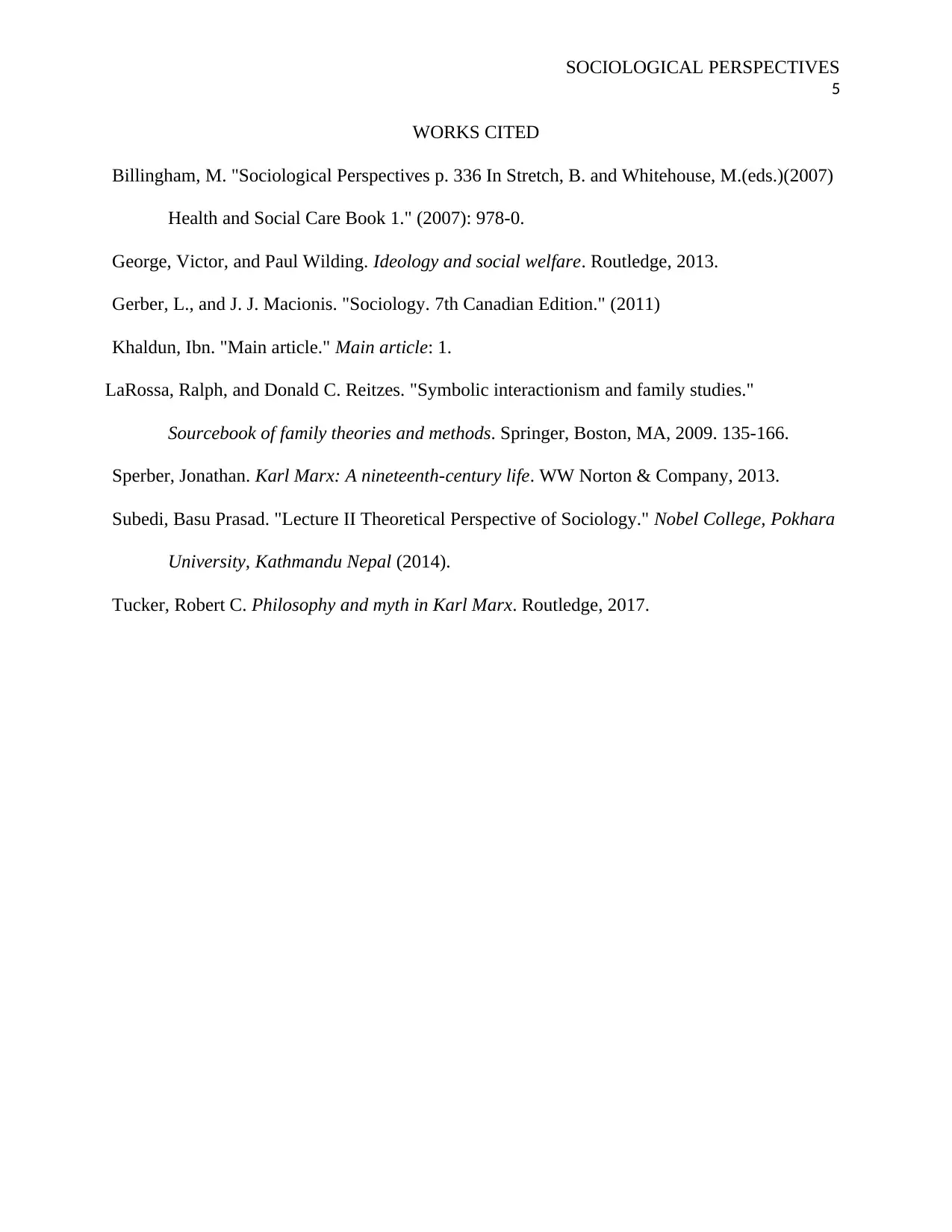
SOCIOLOGICAL PERSPECTIVES
5
WORKS CITED
Billingham, M. "Sociological Perspectives p. 336 In Stretch, B. and Whitehouse, M.(eds.)(2007)
Health and Social Care Book 1." (2007): 978-0.
George, Victor, and Paul Wilding. Ideology and social welfare. Routledge, 2013.
Gerber, L., and J. J. Macionis. "Sociology. 7th Canadian Edition." (2011)
Khaldun, Ibn. "Main article." Main article: 1.
LaRossa, Ralph, and Donald C. Reitzes. "Symbolic interactionism and family studies."
Sourcebook of family theories and methods. Springer, Boston, MA, 2009. 135-166.
Sperber, Jonathan. Karl Marx: A nineteenth-century life. WW Norton & Company, 2013.
Subedi, Basu Prasad. "Lecture II Theoretical Perspective of Sociology." Nobel College, Pokhara
University, Kathmandu Nepal (2014).
Tucker, Robert C. Philosophy and myth in Karl Marx. Routledge, 2017.
5
WORKS CITED
Billingham, M. "Sociological Perspectives p. 336 In Stretch, B. and Whitehouse, M.(eds.)(2007)
Health and Social Care Book 1." (2007): 978-0.
George, Victor, and Paul Wilding. Ideology and social welfare. Routledge, 2013.
Gerber, L., and J. J. Macionis. "Sociology. 7th Canadian Edition." (2011)
Khaldun, Ibn. "Main article." Main article: 1.
LaRossa, Ralph, and Donald C. Reitzes. "Symbolic interactionism and family studies."
Sourcebook of family theories and methods. Springer, Boston, MA, 2009. 135-166.
Sperber, Jonathan. Karl Marx: A nineteenth-century life. WW Norton & Company, 2013.
Subedi, Basu Prasad. "Lecture II Theoretical Perspective of Sociology." Nobel College, Pokhara
University, Kathmandu Nepal (2014).
Tucker, Robert C. Philosophy and myth in Karl Marx. Routledge, 2017.
1 out of 5
Related Documents
Your All-in-One AI-Powered Toolkit for Academic Success.
+13062052269
info@desklib.com
Available 24*7 on WhatsApp / Email
![[object Object]](/_next/static/media/star-bottom.7253800d.svg)
Unlock your academic potential
Copyright © 2020–2025 A2Z Services. All Rights Reserved. Developed and managed by ZUCOL.





